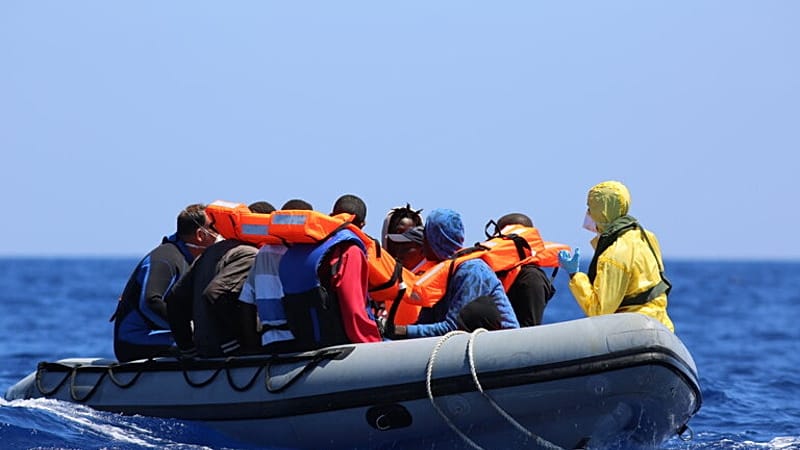Poland and Hungary among those ready to challenge EU over 'unacceptable' migration rules

A group of migration hardliners led by Poland and Hungary say they are ready to challenge the EU over a plan to redistribute asylum seekers based on quotas.
On Tuesday, the European Commission announced a new distribution plan to ease the burden of hotspot countries like Italy, Spain and Greece. That means some central and eastern European countries will have to offer assistance.
Poland, Hungary, Slovakia and the Czech Republic have said they will not participate in a quota system and are ready to challenge the Commission.
According to the Pact on Migration and Asylum, all EU countries must contribute, in proportion to their population and total GDP, to alleviate the burden on countries considered “under migratory pressure”, mostly located in southern Europe.
They are allowed to do so in three ways: by relocating a certain number of asylum seekers to their own territory, by paying €20,000 per person they do not agree to relocate, or by financing operational support in member states deemed "under pressure," such as Italy and Spain. A combination of the three is also possible under the rules.
The total amount and the share of relocations will be decided before the year by the member states. The 27 will have to build a “solidarity pool”, based on a proposal from the Commission which is highly classified and not expected to be made public.
30,000 relocations and €600 million in financial contributions are the minimum set by law.
Furious reaction to migration quota system
Poland, Hungary, Slovakia, and the Czech Republic have stated they do not want to contribute - be it by accepting relocations or making a financial contribution.
"Poland will not be accepting migrants under the Migration Pact. Nor will we pay for it", Polish Prime Minister Donald Tusk wrote on X shortly after the presentation of the Commission's report. Tusk is under pressure to take a hard line on migration, which is highly contested by the conservative opposition.
Hungarian Prime Minister Viktor Orbán also took a hard line: “We will not implement the Migration Pact ... We will not take in migrants, and we will not pay a single forint for them”.
Hungary is scheduled to hold an election in April in which Orbán is looking to make migration a central theme and display his government's "zero migrant" policy as a key campaign issue.
Earlier this year, Slovakia’s Prime Minister Robert Fico sent a similar warning to Brussels, arguing that his country would not participate in the scheme and would not pay into the solidarity pool either. Fico has also taken a hard line on migration and is aligned with Orbán's "zero migrant" motto.
Incoming Czech Prime Minister Andrej Babiš has yet to appoint a cabinet but has already rejected the quota system, citing "national security reasons".
“Our party disagrees with the migration pact, which poses a direct threat to our security. We reject it”, ANO MEP Jaroslav Bžoch told Euronews.
Can EU countries refuse a migration quota system?
In theory, all EU member states should participate in the programme and offer solidarity — financial or operational — to the member states facing the highest number of arrivals.
Still, exemptions can be negotiated.
According to the Commission’s assessment, the Czech Republic and Poland are among the six countries that could request an exemption from the solidarity pool as they are classified as "facing a significant migratory situation" too.
Poland is expected to ask for one immediately and the Czech Republic will follow suit soon, EU officials told Euronews.
Any exemption has to be approved by EU ministers through a qualified majority. This means that 15 out of 27 member states, representing at least 65% of the total EU population, have to support it.
If an exemption is granted to an EU country, its share of relocations and its financial contribution are not reassigned to other states, meaning that countries “under migratory pressure” will receive less help in the overall package.
This could lead to serious backlash by the European Council, represented by the heads of state of the 27.
The definition of what the "solidarity pool" entails and who is given an exemption is an extremely sensitive issue. European officials admit it will be difficult to grant an exemption to a country and deny it to another.
“The implementation of the migration pact will be very difficult, most of the member states would prefer to avoid relocations because of the backlash they could face at home,” a diplomat told Euronews.
Countries like Hungary and Slovakia, which would not, in principle, be entitled to ask for an exemption because they are not considered to be under "severe" migration pressure, could still challenge the law.
“It's clear that, if the majority of member states refuse their share of relocations, the Commission won't fine them all. This will be very difficult to implement on the ground”, the diplomat said. The Commission initially missed a 15 October deadline for the proposal, underscoring the issue's delicate and volatile nature.
With little time left before the end of the year, the matter will likely be discussed by the 27 leaders during the final European Council of the year set for 18-19 December.

